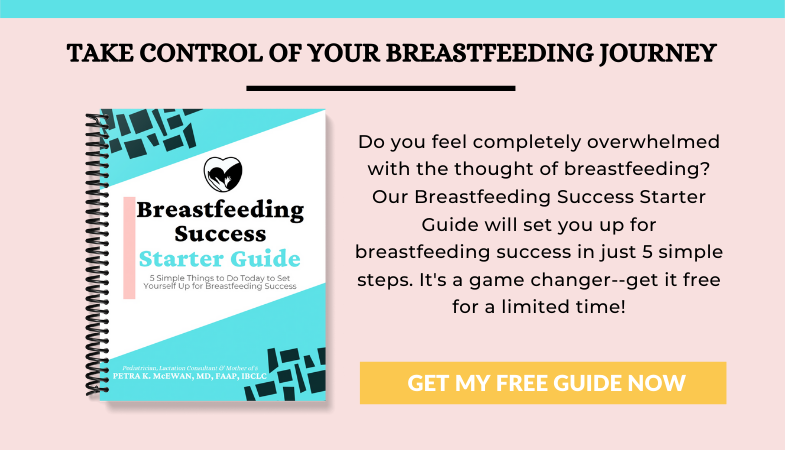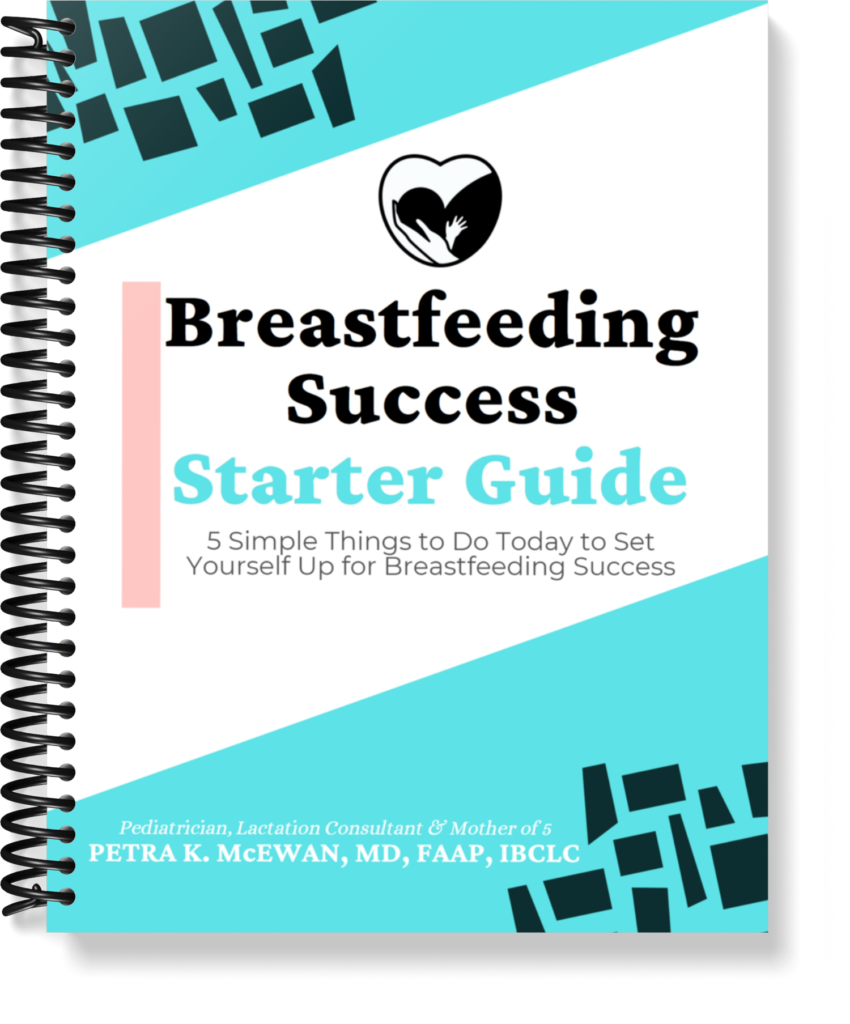If you can survive breastfeeding a newborn you can survive anything! Breastfeeding is the best, most natural way to feed a newborn baby, but it’s not always easy. It comes with loads of benefits, but can be exhausting and stressful, especially in the first few weeks. Having breastfed 5 babies, here are my tips for surviving newborn breastfeeding.
What To Expect & Tips To Help:
Contractions
Just when you thought labor was over, there are after-shocks! Be prepared. Your uterus will contract every time you breastfeed your newborn. The same hormone (oxytocin) that causes milk let-down with breastfeeding also helps the uterus to contract back down to normal size. You can also feel discomfort in your breast when let-down happens (let-down is when the milk starts to really flow after the first minute or so or your baby sucking at the breast).
Tip: Check with your doctor about taking ibuprofen as needed for contractions, if they’re too painful. They will settle down once your uterus is back to its normal size, within a few weeks.
Early Feedings
In the first few days after having a baby, your breasts will produce colostrum, which is a clear, thick liquid. You only produce a small amount per day, but it’s rich in fat, nutrients, and antibodies for your baby. It’s usually enough for your baby, but you’ll notice he’ll be more satisfied when your milk comes in. The “true” breast milk comes in between day 3-5.
Tip: Don’t get discouraged that “nothing’s coming out”. If you can see colostrum coming out when you press on your breast, then just keep feeding! Feeding frequently can encourage your milk to come in. It’s exhausting, but feeding at least every 2-3 hours is ideal, for 15-20 minutes per breast. Skin-to-skin is also so beneficial, especially right after delivery. This is when most babies are wide awake, before they go through their sleepy period. Keeping your baby close to your breast really helps with your milk supply.
If your baby is not feeding well at the breast, or is too sleepy to feed, I recommend pumping at least at the 3-hour mark, to make sure your breasts are stimulated. Stimulation at the breast sends the signal to your brain that you need to make more milk, and going too long without feeding can hurt your supply in the long run. If your baby is losing too much weight or has issues with jaundice in the first few days, you may be asked to supplement – which is sometimes medically necessary and absolutely OK.
Engorgement
When your milk comes in, it can be overwhelming for you and your baby. If your breasts are too full or engorged (which is common), your baby may not be able to latch well and the swelling in your breasts can be very painful for you.
Tip: Try cool compresses or cabbage over your breasts to soothe them and help with let-down. This can help to relieve the pressure and unblock milk ducts. Pump for comfort to relieve the pressure of extra milk in the breast, but beware that the more your empty the breast, the more milk you’ll make! You want to pump to make yourself more comfortable, not less. Massage your breasts during feeding to soften them. Check with your doctor on taking ibuprofen as needed for discomfort. If you have a fever, significant breast tenderness, and/or body aches, see your doctor to rule out mastitis.
Milk Overflow
When your milk comes in, you’re usually producing way more than your baby can take with each feeding. Your breasts will likely leak from this overflow of milk. Since breastfeeding is based on supply and demand, this should even out in first few weeks.
Tip: Use nursing pads to help with any leakage. With my kids, I used these Avent Comfort Breast Shells to catch milk that leaked from the opposite breast when I was feeding my baby. One of my patient’s moms recently told me about this Haakaa Silicone Breast Pump, which actually creates suction, and can serve the same purpose – to get milk and relieve one breast while you’re nursing on the other.
Baby’s Output
Right after birth, your newborn should have at least 1 wet diaper per day of life, up to 7-8 per day (ex: 1 wet diaper in the first 24 hours, 2 in the 2nd 24 hrs, etc). Your baby’s poop starts out as a dark, sticky, tar-like meconium. Once your milk comes in, your baby’s poop will change from that dark meconium to yellow, seedy stools. This is one sign that your baby’s getting enough breast milk. Your baby’s diapers will also be more wet. You can expect 3-5 poops and 7-8 wet diapers per day once your milk is fully in.
Tip: Monitor your baby’s wet diapers and poopy diapers. If your baby’s stools don’t seem to be changing from meconium by day 5, or if you’re getting less than the ideal number of wet diapers per day, your Pediatrician may recommend pumping and feeding or supplementing with formula. Again, this is absolutely OK!
Let-Down
Let-down (again, when the milk starts to really flow after the first minute or so or your baby sucking at the breast) can be overwhelming in the first few weeks since you’re likely over-producing milk. Some women may have a significant let-down the entire time they’re breastfeeding. A heavy let-down may cause gagging and choking in your baby, because the milk is coming out faster than the baby can suck and swallow.
Tip: Talk to your Pediatrician to make sure the let-down is the problem, and that your baby doesn’t have any other feeding issues. Changing breastfeeding positions, by reclining backwards and having your baby more on top of the breast (instead of below the breast), can help decrease the effect of gravity on your let-down. You can also try to hand-express or pump a little off before putting your baby to the breast. This way, you can avoid the force of the milk let-down directly in your baby’s mouth.
Breastfeeding Pain
Breastfeeding is not supposed to be painful, but I honestly had discomfort at the beginning of feedings for the first few weeks with each of my babies. You shouldn’t experience significant discomfort or cracked, bleeding nipples in the process, though. Most times, if your baby is causing too much pain and damaging your nipple, he isn’t latching onto the breast properly or may have a physical problem with his mouth, such as a tongue tie (extra tissue under the tongue that can restrict its movement, and hurt breastfeeding). An improper latch or tongue tie cause your baby to not empty the breast properly. This can lead to poor weight gain for your baby, and a decreased milk supply for you.
Tip: Get help from a lactation consultant right after delivery, to be sure that you’re starting off on the right foot with breastfeeding. The earlier the better because you don’t want your baby to develop any bad breastfeeding habits so early. You also don’t want to lose your supply! A lactation consultant can help your baby to latch properly, and can help you to find the best breastfeeding positions. Tongue ties can be repaired, if necessary. I’ve seen awesome results in breastfed babies after tongue clipping, but keep in mind that not all tongue ties need to be clipped if all is going well. If you’re having any breastfeeding difficulty, get help!
Cluster Feeding
Your newborn should normally feed every 2-3 hours. But, he may want to cluster feed at times – or feed more frequently. This can drive some moms crazy! Your baby may go through periods of feeding every hour, then sleep longer than usual, without needing to feed. Don’t always assume that feeding often is a sign your baby’s starving. Cluster feeding makes surviving newborn breastfeeding THAT much harder!
Tip: Rest easy and know that cluster feeding is normal. It’s not always a sign of hunger. If your baby’s having normal wet diapers and poops, and is gaining weight normally, then your supply is likely not the issue. Feed your baby on demand, respond to his needs. This is when it’s most important to sleep when your baby sleeps! When cluster feeding is happening, you don’t know when you’ll get those longer stretches of sleep. So try to lay down whenever your baby does. Have others pitch in to help with household duties when you’re exhausted.
Nipple Confusion
Pacifiers and bottles can sometimes cause “nipple confusion” in the first few weeks for a breastfed baby. Babies use a different type of latch and suck on a pacifier or bottle vs feeding at the breast. The pacifier and bottle tend to be “easier” to use. This can leave your baby frustrated when he has to come back to feed at the breast.
Tip: Stay away from pacifiers and bottles until breastfeeding is “established”. Wait until both you and your baby really get the hang of breastfeeding, and can do it easily. If your baby is rooting or putting his hand in his mouth, feed him. Let your breast be the pacifier for now (unless your baby is having issues with overfeeding, bloating, or reflux). Again, the more your baby feeds at the breast, the better your supply will be! The more you substitute artificial nipples for your breast, you can actually hurt your supply. Also, the more often you feed at the breast, the more you and your baby can practice. Of course, if your baby needs more milk than you can provide, bottles may be necessary to supplement. Before your baby gets a bottle, I still recommend practicing at the breast with each feeding.
Weight Loss
Your baby’s weight needs to be monitored closely – especially in the first few weeks. Babies are allowed to lose about 7-10% of their birth weight. They usually lose weight in their first week of life, then start gaining back in the second week. Your baby should be back to his birth weight by 2 weeks old.
Tip: Schedule regular Pediatrician’s visits to make sure your baby isn’t losing too much, and is eventually gaining appropriately. In my office, we typically see newborns at 4-5 days old, 2 weeks of life, then at 1 month.
Exhaustion
The reality is that breastfeeding a newborn can be exhausting. This little human demands so much of your time and energy and is physically draining your body of nutrients!
Tip: Try your best to take care of yourself. Sleep when your baby sleeps, whenever possible. Don’t expect a regular schedule. Get help from family and friends. In the early weeks, only allow visitors who’ll be helpful. Avoid having visitors that are just coming over to talk and keep you up when your baby’s asleep – and don’t feel bad about it! To limit having to run around before feedings, set up a “home base” at all the places you’ll be nursing your baby at home. Set up things that you’ll need to keep you comfortable, such as a boppy pillow, blanket, snacks, and water for yourself. Keeping these things close will remind you to take care of yourself! Join a Breastfeeding Support Group, with other moms who are going through the same thing! You’re not alone!
Breastfeeding a newborn is a full-time job. Your boss is pint-sized, cute, and very demanding. Surviving newborn breastfeeding isn’t always easy, but it’s so worth it in the long run. It’s amazing how quickly these early weeks and months fly by. Believe it or not, you’ll look back and actually miss the time you were breastfeeding your newborn. So, keep at it! You can do it!
Do you have any other tips for surviving newborn breastfeeding? I’d love to hear them. Just leave them in the comments below!
Looking for more help?
If you’re experiencing any breastfeeding issues – if you just want to make sure you’re doing things right – I’d be happy to help. Take a peek at the different types of breastfeeding consultations I offer, and request an appointment when you’re ready. I’m here for you and all your breastfeeding needs!
The post originally appeared on Wifey Mommy Doc, a blog focused on helping working wives and moms find balance in their many roles.
Surviving Newborn Breastfeeding
If you love these tips, be sure to check out my 75+ page digital library, filled with step-by-step instructions and the tools you need to learn the basics and adapt to life while breastfeeding, troubleshoot breastfeeding problems, go back to work while breastfeeding, wean – and so much more!





